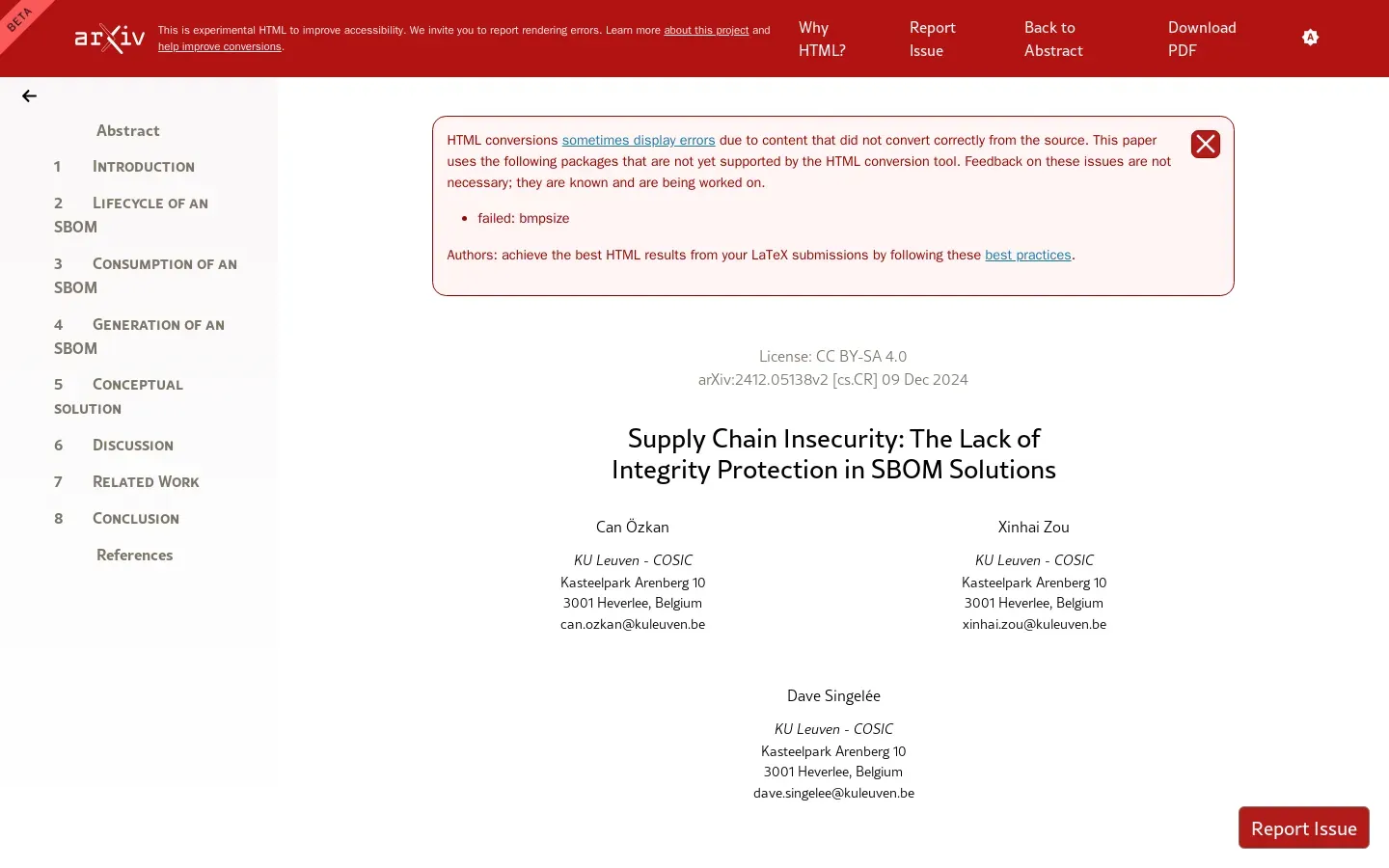
Decentralized Framework Proposed to Enhance Software Integrity
/ 4 min read
Quick take - Recent research has introduced a decentralized framework designed to improve the integrity and transparency of software supply chains through the use of Software Bills of Materials (SBOMs) and decentralized storage solutions, with implications for enhanced cybersecurity and regulatory compliance.
Fast Facts
- Decentralized Framework: A new decentralized framework enhances software supply chain integrity and transparency through Software Bills of Materials (SBOMs) and decentralized storage solutions.
- Key Findings: The framework improves software component verification, distributes ownership to reduce single points of failure, and enhances public monitoring and transparency.
- Cybersecurity Implications: Adoption of SBOMs increases visibility in software supply chains, necessitating robust integrity controls to combat evolving cyber threats.
- Framework Components: Key components include SBOMs, a decentralized hash repository for software integrity, and digital signatures for authenticity verification.
- Future Applications: Potential applications include integration with DevSecOps, improved malware detection, regulatory compliance support, and enhanced cross-organizational threat intelligence collaboration.
Advancements in Cybersecurity: A Decentralized Framework for Software Integrity
In a significant stride towards bolstering cybersecurity, recent research has introduced a decentralized framework designed to enhance the integrity and transparency of software supply chains. This innovative approach leverages advanced technologies, including Software Bills of Materials (SBOMs) and decentralized storage solutions, to address growing concerns over software security across various industries.
Key Objectives and Research Insights
The primary goal of this research is to develop a decentralized system that can store and verify software hash values, thereby strengthening the integrity and transparency of software supply chains. The study also seeks to evaluate the feasibility of implementing such a solution in real-world scenarios, focusing on storage requirements and verification speeds.
Enhanced Software Integrity Verification
One of the standout findings of the study is the framework’s ability to significantly improve verification processes for software components. By doing so, it increases trust within software supply chains, a critical factor as cyber threats become more sophisticated.
Decentralized Ownership Control
The framework employs a decentralized approach to distribute ownership and control over software components. This method reduces single points of failure, enhancing overall system resilience against potential attacks.
Public Monitoring and Transparency
Another key feature is its capacity to boost public monitoring capabilities. By allowing stakeholders to track software integrity effectively, the framework promotes greater transparency within the supply chain.
Integration with Existing Security Frameworks
Importantly, the proposed system can be seamlessly integrated with current cybersecurity measures. This integration offers a comprehensive security solution that enhances existing frameworks rather than replacing them.
Implications for Cybersecurity
The implications of these findings are profound for cybersecurity:
-
Enhanced Supply Chain Security: The adoption of SBOMs provides organizations with improved visibility into their software supply chains, facilitating quicker identification of vulnerabilities.
-
Robust Integrity Controls: The research highlights the critical need for robust controls to maintain software integrity amid evolving cyber threats.
-
Decentralized Solutions for SBOM Integrity: Utilizing a decentralized hash repository secures software components while ensuring data integrity and immutability.
-
Regulatory Compliance: The framework supports compliance with emerging regulations mandating transparency in software supply chains.
Proposed Framework Components
The proposed framework comprises several essential components:
-
Software Bill of Materials (SBOM): A machine-readable inventory that enhances transparency by detailing all software components.
-
Decentralized Hash Repository: A blockchain-based repository that stores hash values, ensuring both integrity and immutability.
-
Digital Signatures: Cryptographic signatures that authenticate and verify the integrity of SBOMs and software components.
Methodology and Tools
The research utilized a robust methodology involving:
-
Decentralized Repository Design: Facilitating secure handling of software components through a well-structured registration and verification process.
-
Blockchain Technology: Employed alongside a Certificate Transparency Mechanism to bolster security and verification processes.
Strengths and Limitations
While the research presents significant strengths, such as potential improvements in software integrity verification and public transparency, it also faces limitations. These include challenges related to practical implementation, particularly concerning storage capacity and operational speeds.
Future Directions or Applications
The implications of this research extend into various future applications:
-
Integration with DevSecOps Pipelines: Streamlining security practices within the software development lifecycle.
-
Enhanced Malware Detection: Improving response times and detection capabilities against malware threats.
-
Regulatory Compliance: Assisting organizations in meeting compliance standards effectively.
-
Cross-Organizational Collaboration: Facilitating greater collaboration among organizations for threat intelligence sharing.
As industries continue to grapple with complex cybersecurity challenges, this decentralized framework offers a promising avenue for enhancing software integrity and transparency. Stakeholders are encouraged to explore its potential applications further, considering both its strengths and limitations in real-world contexts.



